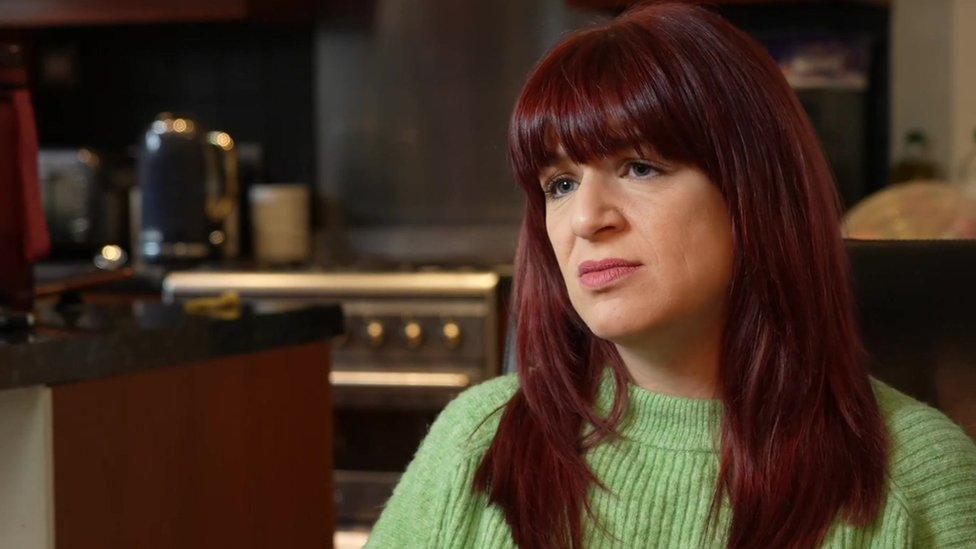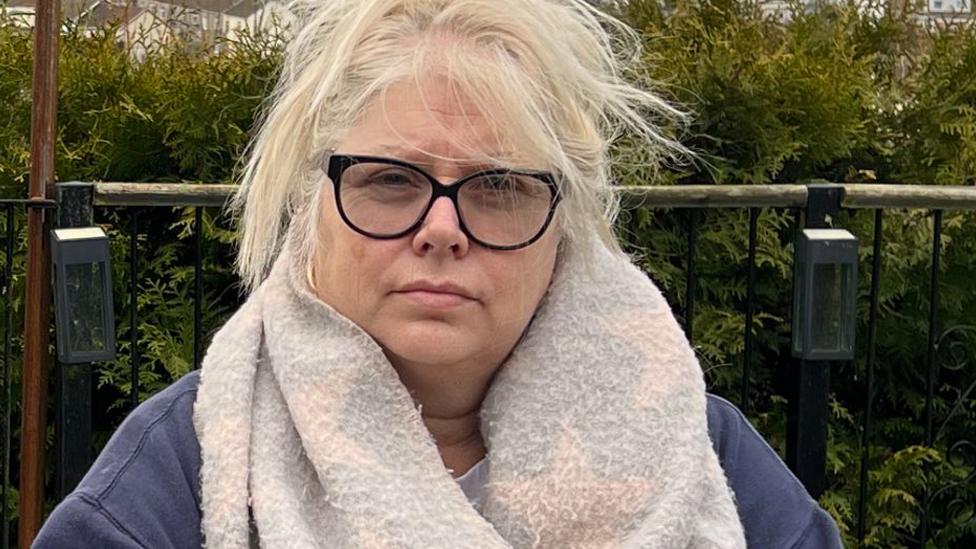Soaring prices: 'I may have to move back in with my parents'
- Published

Millions of people across the country will see their gas and electricity bills jump in April, further pushing up the cost of living.
It's because the energy price cap - which limits what suppliers in Britain can charge - has been raised by 54%.
People on default tariffs who pay by direct debit will see an increase of £693, from £1,277 to £1,971 per year.
We asked people for their thoughts on the changes and new government plans to help ease the pressure on households.

'I might have to move back in with my parents'

Among those worried about the impact on their finances is 24-year-old Michael Ball, from Kirkcaldy in Scotland.
The two words he used to describe the energy price cap changes? "Oh dear."
He spends about a quarter of his income from two part-time jobs and Universal Credit on energy bills to heat his one-bedroom flat. It's more than the rent itself.
Michael pays for his electricity through a pre-payment meter. He's already taken certain steps to reduce his energy bills, like washing his clothes at his mum and dad's house nearby.
Under the changes announced on Thursday, pre-payment customers will see an increase in the energy price cap of £708 from £1,309 to £2,017.
"I do worry about money a lot. It's a big burden and this news is something that makes me feel anxious," Michael says.
He says he may need to think about moving back in with his parents if his energy bills continue to rise. As someone with bipolar disorder, he's also concerned about the impact on his wellbeing.
"If I lose my independence, my own space, I worry about how it might affect my finances and mental health."
The energy bill discounts of up to £350 unveiled by the chancellor on Thursday seem "a bit 'buy now, pay later'", he adds. He also isn't sure how much immediate help the move would offer low-income renters.
"Politicians don't seem to appreciate what people like me are going through."

'Everything seems to be rising at the same time'

Suzanne Samaka lives in Watford with her partner and their children. She's about to see her maternity leave pay decrease and is worried about the cost of living.
"It's worrying and difficult at a time when everything seems to be rising at the same time... whether it be utilities, interest rates, utilities or food."
Suzanne was previously paying £92 a month on a fixed tariff for energy. But according to an updated account balance, she is now in arrears of £400.
The family is spending less on the food shop as a result, and Suzanne says they are cutting back on leisure and holidays "to make sure we can cover bills comfortably".
Turning the heating down with a small baby in the house "is not really an option".
"You have to make cutbacks on things that create memories and nice times with the children," Suzanne says.

'It plunges people into uncertainty'

George Mycock, the 25-year-old founder of mental health organisation MyoMinds, moved to London from Stoke-on-Trent two weeks ago.
In the run-up, he was finding it difficult to find somewhere within his budget.
He's ended up having to pay £950 a month for a room in a four-bedroom flat share. With bills included, it works out at about 70% of his monthly income.
His flatmates have already seen bills go up by between £50 and £100 each in the last few months. But he says the rise in energy bills that will kick in in April is "scary".
"We don't know how much we're going to have to pay [on our default tariff]," George says. "It's plunged people into uncertainty."
He's already cut back on his groceries by using the app 'Too Good to Go', which allows him to pick up discounted or free food near expiry.
But as someone who has suffered with an eating disorder in the past, he describes rising bills as worrying: "The idea of food being restricted for me, when I've worked so hard to overcome that [problem] makes me nervous."
He's sceptical the government's energy bill discounts will make much difference to the worst off.
"Coming from Stoke, people around there are barely surviving. I'm not sure how these measures will make a difference for those people in poverty in the long-run."

'Time for further cutbacks'

Although energy bills won't rise immediately for customers who are currently on fixed rate tariffs, they are likely to see an increase when their deals end.
Liz Cox, a foster carer and full-time worker in South Wales, is considering her options ahead of her deal ending in three weeks' time.
Her nine-bedroom household currently spends about £592 per month on energy. But she's been quoted as much as £1,775 per month to renew her energy contract for the next 12 months.
While her husband earns a good income, Liz says: "Most of the kids are out at school all day, and the other two are in work, so I don't understand how the cost can be so high."
Why are UK energy prices so high?
She has taken steps to reduce their energy usage such as using LED lights and reducing the number of freezers in the house to one large one, rather than multiple appliances.
As their dormer bungalow falls into council tax band E, they won't be eligible for the £150 rebate being offered.
"We'll have to make further cutbacks. I currently use the oven three or four times a week, but I'll need to think about batch-cooking instead."
She is also getting their meter investigated, as she fears the readings it produces are incorrect. But Liz has been feeling the pinch elsewhere too.
"Energy prices affect our bills, but you've also seen shops putting prices up," she says, adding that the family now does a food shop every two or three weeks to avoid spending too much.
"It's something I really struggle to understand, it's diabolical."
Related topics
- Published3 February 2022

- Published23 January 2022

